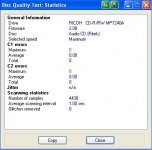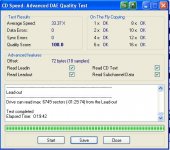Well, "ones" and "zeros" don't carry noise. So in a sense, CDs don't carry noise other than what's on the master. But the problems are real. I had problem burning anything audio and video for a while. The problem was that I had my CD and DVD drives on the same IDE. The sound would stutter and the image break up into squares, and that even when I burned files from the hdd! Once I hooked up one to the hdd IDE, the problem disappeared.
Whilst CDs may be 'digital' the pits and lands recorded on them that represent the 0s and 1s are actually in a way analogue and the quality of them is influenced by the write speed and media quality. If the pit/land definition is poor (due to poor spacing between them and/or pits not burnt deep enough) then the reader will read incorrectly. This is why media brand, write speed and read speed make a difference.
Over time, the dye used can deteriorate, exaggerating the problems above and thus the CD become more error containing and eventually unreadable.
Over time, the dye used can deteriorate, exaggerating the problems above and thus the CD become more error containing and eventually unreadable.
i think u are right , maybe when u burn at high speeds the slow drives cant detect it because at high speeds the "hole" that is made by the laser is much smaller at high speeds ,so slow drives aint got resulution to detect this.
btw , for all of u that using win XP , the DMA at the secondary IDE channel is OFF!!! u should turn it on manually , i didnt know that at first so my cds also had pops and clicks and million buffer underruns avoided
btw , for all of u that using win XP , the DMA at the secondary IDE channel is OFF!!! u should turn it on manually , i didnt know that at first so my cds also had pops and clicks and million buffer underruns avoided
Have you ever considered this?
Think of this... Rip some CD. OK, don't rip it, let's say that you have some "perfect" .WAV files on your PC, no clicks, no pops, no problems at all.
Burn them on a data CD, not as CD-A, but as data files.
...
There, all problems solved! Every CD-ROM in the world will read those files as they were written, or it won't read them at all. No clicks, no pops, no jitter BS talk, etc. Send those files into a buffer, reclock with a low-jitter clock and there you have it: the perfect transport. Retail price: $20. The only problem being that I won't be able to read those damned audio CD's.
The audiophile world is messed uo pretty bad. Spending kilobucks on an "audiophile-grade" transport, isn't that stupid?
Think of it for a second: the existence of the concept of "audiophile-grade transport" is justified only by those 304 (2352 minus 2048) extra bytes per sector on a CD-A. Nothing more!
A CD-A already has pretty sophisticated error-correction mechanisms, that take as much as space as the audio data itself on a CD. But those 10% extra bytes... Your $10 transport won't be able to read that information correctly because of those 304 bits.
Bottom line is: I think CD-A should die. It is flawed and it just justifies too much snake-oil products. But for some reason we're stuck with it.
And to get back to the subject.
I ripped the original CD as .WAV files and I listened to it. It sounded OK. The deterioration occured when burning, that's for sure. It is very possible that it was something concerning DMA, since I had some problems with it back then.
After all, do you think that there is some difference between "special" audio CD's and normal ones? I once read somewhere that the only difference is that they cost much more.
Think of this... Rip some CD. OK, don't rip it, let's say that you have some "perfect" .WAV files on your PC, no clicks, no pops, no problems at all.
Burn them on a data CD, not as CD-A, but as data files.
...
There, all problems solved! Every CD-ROM in the world will read those files as they were written, or it won't read them at all. No clicks, no pops, no jitter BS talk, etc. Send those files into a buffer, reclock with a low-jitter clock and there you have it: the perfect transport. Retail price: $20. The only problem being that I won't be able to read those damned audio CD's.
The audiophile world is messed uo pretty bad. Spending kilobucks on an "audiophile-grade" transport, isn't that stupid?
Think of it for a second: the existence of the concept of "audiophile-grade transport" is justified only by those 304 (2352 minus 2048) extra bytes per sector on a CD-A. Nothing more!
A CD-A already has pretty sophisticated error-correction mechanisms, that take as much as space as the audio data itself on a CD. But those 10% extra bytes... Your $10 transport won't be able to read that information correctly because of those 304 bits.
Bottom line is: I think CD-A should die. It is flawed and it just justifies too much snake-oil products. But for some reason we're stuck with it.
And to get back to the subject.
I ripped the original CD as .WAV files and I listened to it. It sounded OK. The deterioration occured when burning, that's for sure. It is very possible that it was something concerning DMA, since I had some problems with it back then.
After all, do you think that there is some difference between "special" audio CD's and normal ones? I once read somewhere that the only difference is that they cost much more.
Re: Have you ever considered this?
It sounds like your problem is almost solved. You can rip to a WAV file and that sounds good. If I understand your post correctly, you were previously having problems with DMA, and have since fixed those problems. But the disk that sounded bad was burned during the time you were having DMA problems? If that's the case, then I would think that burning the good WAV files to CD now should give a good result, since your DMA problem is now fixed.
🙂 . Reminds me of a post I read in the Digital area over at Audio Asylum. The poster had bought a $1000 Benchmark DAC1 (a fine piece of gear with excellent measured performance). He hooked it up to his "audiophile quality" transport. After some time, the sound quality began to deteriorate. Previously he had ordered a CD test disk called "The CD-Check Test Disc" that has 5 different severities of physical damage on the disk. He tried this disk with his "audiophile quality" transport, and it only got to level two before choking. He then tried the same test with a consumer-grade CD player. It reached level 4. So he hooked up his consumer-grade CD player to the Benchmark DAC and listened to a CD that sounded bad before. Problem solved! So much for "audiophile quality".
I had a somewhat similar experience too. I have a CD that I accidentally dropped on a hard floor. It landed flat and scratched the bottom. My Onkyo DVSP1000, which has a street price of $1600, skipped pretty badly when playing this disk. After discovering that my LiteOn combo drive had faulty DAE, I ordered an AOpen COM5232 / AAH combo drive to replace it. Cost me $33.50. This drive passed level 5 of "The CD-Check Test Disc" in the test at cdrinfo.com. I put the scratched disk into the new AOpen drive, and ripped it to WAV using EAC in secure mode. Not only did it rip the disk without errors, but it didn't even slow down in the process. So I burned the WAVs to disk and played them on the Onkyo. No audible problems whatsoever. I was really happy, because the scratched disk was part of a 2-CD set. It would have cost me almost as much as the new computer combo drive to replace the CDs.
It sounds like your problem is almost solved. You can rip to a WAV file and that sounds good. If I understand your post correctly, you were previously having problems with DMA, and have since fixed those problems. But the disk that sounded bad was burned during the time you were having DMA problems? If that's the case, then I would think that burning the good WAV files to CD now should give a good result, since your DMA problem is now fixed.
mr_push_pull said:The audiophile world is messed uo pretty bad. Spending kilobucks on an "audiophile-grade" transport, isn't that stupid?
🙂 . Reminds me of a post I read in the Digital area over at Audio Asylum. The poster had bought a $1000 Benchmark DAC1 (a fine piece of gear with excellent measured performance). He hooked it up to his "audiophile quality" transport. After some time, the sound quality began to deteriorate. Previously he had ordered a CD test disk called "The CD-Check Test Disc" that has 5 different severities of physical damage on the disk. He tried this disk with his "audiophile quality" transport, and it only got to level two before choking. He then tried the same test with a consumer-grade CD player. It reached level 4. So he hooked up his consumer-grade CD player to the Benchmark DAC and listened to a CD that sounded bad before. Problem solved! So much for "audiophile quality".
I had a somewhat similar experience too. I have a CD that I accidentally dropped on a hard floor. It landed flat and scratched the bottom. My Onkyo DVSP1000, which has a street price of $1600, skipped pretty badly when playing this disk. After discovering that my LiteOn combo drive had faulty DAE, I ordered an AOpen COM5232 / AAH combo drive to replace it. Cost me $33.50. This drive passed level 5 of "The CD-Check Test Disc" in the test at cdrinfo.com. I put the scratched disk into the new AOpen drive, and ripped it to WAV using EAC in secure mode. Not only did it rip the disk without errors, but it didn't even slow down in the process. So I burned the WAVs to disk and played them on the Onkyo. No audible problems whatsoever. I was really happy, because the scratched disk was part of a 2-CD set. It would have cost me almost as much as the new computer combo drive to replace the CDs.
- Status
- Not open for further replies.
- Home
- General Interest
- Everything Else
- Enlighten me please - why does the quality of copied audio CD's deteriorate so bad?


